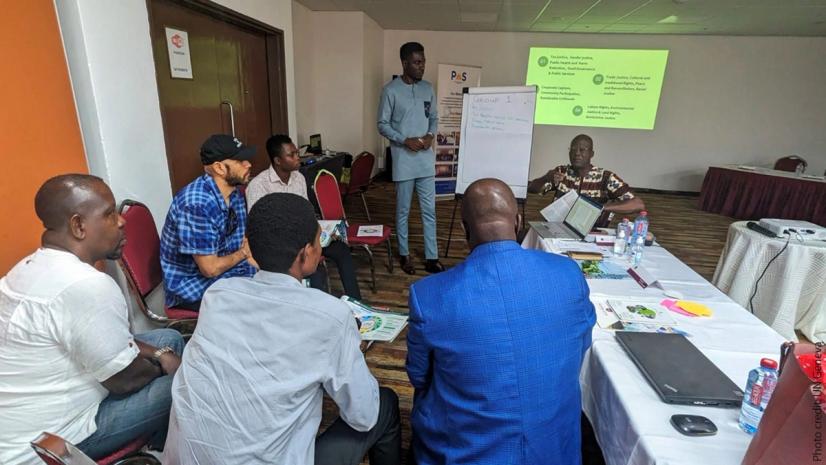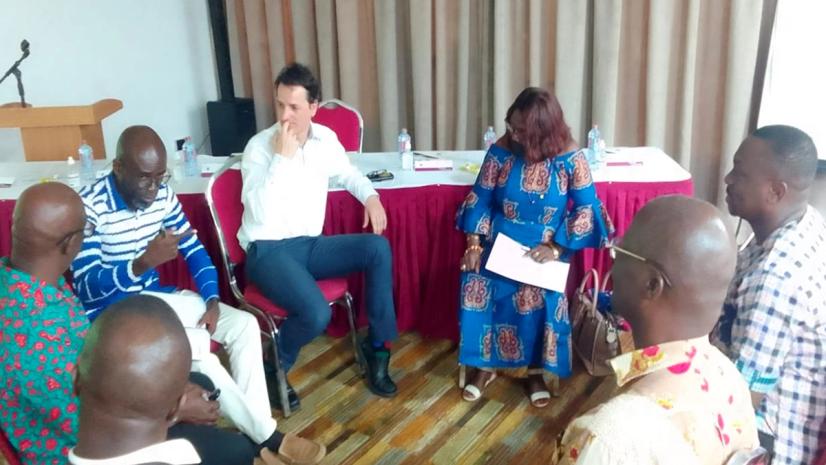POS Foundation
Envisioning equitable cannabis reform in Ghana
Accra, Ghana, was recently host to a visionary conference on the future of cannabis in the country. The event, organised by POS Foundation, Health Poverty Action, the International Drug Policy Consortium, and the West Africa Drug Policy Network, brought together over 50 participants from the drug policy reform and economic justice sectors, policymakers and cannabis farmers across Ghana.
The two-day conference on 25 - 26 April titled “An Equitable Roadmap for the Legal Regulation of Cannabis in Ghana that Protects Livelihoods and Supports Sustainable Development” sought to explore drug policy reform beyond the Narcotics Act 1019 (2020) and look towards establishing a shared, equitable vision for the legal regulation of medical and adult-use cannabis.
Three key areas were addressed: the historical and current harms caused by prohibition; the significant risks of international corporate capture of future legal trade; and, the opportunities of legal regulation to prioritise social and economic justice and achieve a sustainable transition for those working in the trade.
Photo credit: POS Foundation
Through participatory and cross-sector workshops, participants were invited to envision models of legal regulation for industrial hemp, medical and adult-use cannabis using Health Poverty Action’s Social Justice Lens. The models of regulation developed sought to address the harms of prohibition and strengthen a wide range of social justice areas, such as governance, public health, environmental protection and human rights.
The models of regulation developed sought to address the harms of prohibition and strengthen a wide range of social justice areas, such as governance, public health, environmental protection and human rights.
This process culminated in a draft vision presented to policymakers on day two. The vision highlighted some clear shared goals, notably in relation to gender equality, avoiding corporate capture and progressive taxation. Participants strongly highlighted the gender dimension, with farmers proposing that the market regulations adopt a gender-sensitive approach to address the issues of disproportionate harm and exclusion experienced by women under prohibition, as well as the lack of comprehensive childcare for agricultural workers. Many suggested that the revenues raised from taxes from the new cannabis market should support the provision of childcare, removing barriers in women's access to stable livelihoods in farming.
Photo credit: POS Foundation
They also called for the legal market to be equitably taxed, and for measures to be implemented to impede the diversion of fiscal revenue into tax havens. In the same vein, participants called for the reinvestment of taxation into serving national and community needs, particularly public health and harm reduction programmes.
Participants learnt about a range of legal regulatory models being used around the world, all with particular priorities and unique results. Dasheeda Dawson, Founding Director of Cannabis NYC, delivered a special report on day two, inspiring stakeholders with the community-led campaign for social and restorative justice at the heart of New York's cannabis reforms.
The meeting was the first of its kind in West Africa to bring together the expertise and knowledge of Ghanaian trade unionists and economic justice experts with the drug policy community. Participants learnt about other trades in Ghana, such as cashew, biofuel and cocoa, that have all been captured by oppressive and harmful tactics of exploitation from international foreign corporations. A key question voiced loud and clear was whether Ghana would continue its colonial mandate and legacy of producing raw materials for the metropole or could cannabis rewrite the textbook?
A key question voiced loud and clear was whether Ghana would continue its colonial mandate and legacy of producing raw materials for the metropole or could cannabis rewrite the textbook?
To ensure that economic justice is at the heart of any new legal framework for cannabis, measures must be put in place to prevent commercialisation and corporate monopolisation. Our economic justice colleagues urged farmers and civil society to organise themselves into associations and trade unions. Whether these unions should be specific to cannabis or join existing agricultural unions was a critical question to be given further attention. There was strong support for stakeholders to be better equipped with knowledge on how corporations behave and a commitment to continue working on a shared vision of future markets through more intersectoral meetings. After a comprehensive presentation on corporate capture from Steve Rolles, Senior Policy Analyst from Transform Drugs Policy Foundation, participants explored what cannabis corporation ‘takeovers’ might look like and what to anticipate and avoid.
Working on a shared vision helped farmers and civil society to identify risks that regulation might bring about. These were mainly the possibility of new markets facilitating land grabbing and eroding food security for the poorest communities. With an incoming climate crisis farmers agreed that Ghana must not find itself in a situation of planting more cannabis than food, and that sustainable farming methods and environmental safeguards must be prioritised in regulation.
Farmers felt that to ensure local farmers' participation, there is a need for transparency and accountability from the start by considering the inclusion of local content and standardisation in the certification process as it develops, not after. Most farmers believed it is critical to prevent the emergence of foreign or domestic corporate monopolies and use licensing to ensure the market prioritises small and medium-sized businesses.
Feedback from policymakers indicated that the workshop was timely and valuable, Many noted it was a relief to discuss the impacts of cannabis regulation from so many viewpoints and intersections in a non-judgemental space. This allowed everyone to approach the subject through common sense and logical perspective rather than from their specific area of expertise.
Almost all participants concluded that drug policy reform in Ghana must be addressed through multi-sector meetings like these, which allow for a diverse conversation. There was a strong consensus that prohibition was harming communities and an emphasis on seeking ways to avoid repeating the mistakes of other trades that have prioritised big business over people.
There was a strong consensus that prohibition was harming communities and an emphasis on seeking ways to avoid repeating the mistakes of other trades that have prioritised big business over people.
The meeting added to the already progressive and inspiring drug reforms in Ghana and paved the way for a multi-stakeholder journey towards legal regulation that protects livelihoods and supports sustainable development.
The meeting was made possible with financial support from Health Poverty Action.


